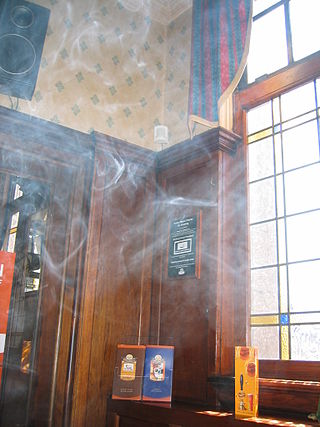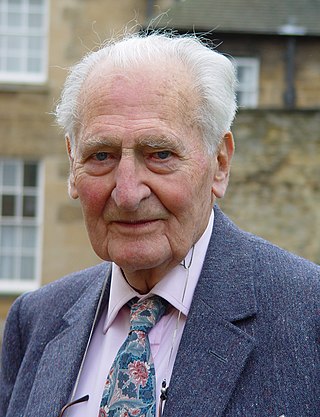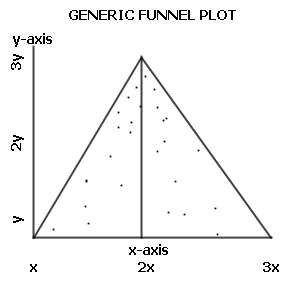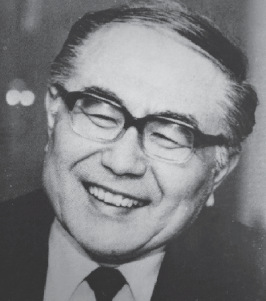Related Research Articles

Passive smoking is the inhalation of tobacco smoke, called passive smoke, secondhand smoke (SHS) or environmental tobacco smoke (ETS), by individuals other than the active smoker. It occurs when tobacco smoke diffuses into the surrounding atmosphere as an aerosol pollutant, which leads to its inhalation by nearby bystanders within the same environment. Exposure to secondhand tobacco smoke causes many of the same health effects caused by active smoking, although at a lower prevalence due to the reduced concentration of smoke that enters the airway.

The British Doctors' Study was a prospective cohort study which ran from 1951 to 2001, and in 1956 provided convincing statistical evidence that tobacco smoking increases risk of lung cancer.

Sir William Richard Shaboe Doll was a British physician who became an epidemiologist in the mid-20th century and made important contributions to that discipline. He was a pioneer in research linking smoking to health problems. With Ernst Wynder, Bradford Hill and Evarts Graham, he was credited with being the first to prove that smoking increased the risk of lung cancer and heart disease.

Candy cigarettes are a candy introduced in the late 19th century made out of chalky sugar, bubblegum or chocolate, wrapped in paper and packaged and branded so as to resemble cigarettes. Some products contain powdered sugar hidden in the wrapper, allowing the user to blow into the cigarette and produce a cloud of sugar that imitates smoke, which comes out of the other end.

Kamran Abbasi is the editor-in-chief of the British Medical Journal (BMJ), a physician, visiting professor at the Department of Primary Care and Public Health, Imperial College, London, editor of the Journal of the Royal Society of Medicine(JRSM), journalist, cricket writer and broadcaster, who contributed to the expansion of international editions of the BMJ and has argued that medicine cannot exist in a political void.

Tobacco products, especially when smoked or used orally, have serious negative effects on human health. Smoking and smokeless tobacco use are the single greatest causes of preventable death globally. Half of tobacco users die from complications related to such use. Current smokers are estimated to die an average of 10 years earlier than non-smokers. The World Health Organization estimates that, in total, about 8 million people die from tobacco-related causes, including 1.3 million non-smokers due to secondhand smoke. It is further estimated to have caused 100 million deaths in the 20th century.

A funnel plot is a graph designed to check for the existence of publication bias; funnel plots are commonly used in systematic reviews and meta-analyses. In the absence of publication bias, it assumes that studies with high precision will be plotted near the average, and studies with low precision will be spread evenly on both sides of the average, creating a roughly funnel-shaped distribution. Deviation from this shape can indicate publication bias.

In the early 20th century, German researchers found additional evidence linking smoking to health harms, which strengthened the anti-tobacco movement in the Weimar Republic and led to a state-supported anti-smoking campaign. Early anti-tobacco movements grew in many nations from the middle of the 19th century. The 1933–1945 anti-tobacco campaigns in Nazi Germany have been widely publicized, although stronger laws than those passed in Germany were passed in some American states, the UK, and elsewhere between 1890 and 1930. After 1941, anti-tobacco campaigns were restricted by the Nazi government.
The Enhancing the Quality and Transparency of health research Network is an international initiative aimed at promoting transparent and accurate reporting of health research studies to enhance the value and reliability of medical research literature. The EQUATOR Network is hosted by the University of Oxford, and was established with the goals of raising awareness of the importance of good reporting of research, assisting in the development, dissemination and implementation of reporting guidelines for different types of study designs, monitoring the status of the quality of reporting of research studies in the health sciences literature, and conducting research relating to issues that impact the quality of reporting of health research studies. The Network acts as an "umbrella" organisation, bringing together developers of reporting guidelines, medical journal editors and peer reviewers, research funding bodies, and other key stakeholders with a mutual interest in improving the quality of research publications and research itself. The EQUATOR Network comprises five centres at the University of Oxford, Bond University, Paris Descartes University, Ottawa Hospital Research Institute, and Hong Kong Baptiste University.
The Public Finance Balance of Smoking in the Czech Republic was a 2001 report commissioned by Philip Morris's Czech division following concerns raised by the Czech health ministry that smoking's costs outweighed its fiscal benefits.
Geoffrey C. Kabat is an American epidemiologist, cancer researcher, and author. He has been on the faculty of the Albert Einstein College of Medicine and State University of New York, Stony Brook. In 2003, he was co-author of a disputed BMJ study funded by the tobacco industry that found secondhand smoke did not affect mortality. Along with his scientific publications, Kabat has written four books and many articles for general audiences. As of 2019, he was a member of the board of directors of the Science Literacy Project and the board of scientific advisors of the American Council on Science and Health.

Takeshi Hirayama was a Japanese cancer epidemiologist and anti-tobacco activist who served as the chief of the epidemiology division at the National Cancer Center in Tokyo from 1965 until 1985. He has been credited with publishing the first study linking passive smoking to lung cancer, and also conducted research on the relationship between certain dietary factors and cancer.
BMJ USA: Primary Care Medicine for the American Physician was a monthly peer-reviewed medical journal published by the BMJ Group as a sister journal to the BMJ. It was intended to publish material specifically relevant to readers in the United States. It was established in 2001 and was discontinued permanently in 2005.
Journalology is the scholarly study of all aspects of the academic publishing process. The field seeks to improve the quality of scholarly research by implementing evidence-based practices in academic publishing. The term "journalology" was coined by Stephen Lock, the former editor-in-chief of the BMJ. The first Peer Review Congress, held in 1989 in Chicago, Illinois, is considered a pivotal moment in the founding of journalology as a distinct field. The field of journalology has been influential in pushing for study pre-registration in science, particularly in clinical trials. Clinical trial registration is now expected in most countries. Journalology researchers also work to reform the peer review process.

The Public Health Act 1984 is a piece of legislation for England and Wales which requires physicians to notify the 'proper officer' of the local authority of any person deemed to be suffering from a notifiable disease. It also provides powers to isolate infected individuals to prevent the spread of such a disease. The act forms the basis of various legislation connected to the COVID-19 pandemic in the United Kingdom.
Peymané Adab is a British physician who is a Professor of Public Health at the University of Birmingham. She leads the Institute of Applied Health Research Chronic Disease Management Team. Adab investigates the epidemiology and management of obesity and chronic obstructive pulmonary disease.
Azeem Majeed is a Professor and Head of the Department of Primary Care & Public Health at Imperial College, London, as well as a general practitioner in South London and a consultant in public health. In the most recent UK University Research Excellence Framework results, Imperial College London was the highest ranked university in the UK for the quality of research in the “Public Health, Health Services and Primary Care” unit of assessment.
Nisreen Ala-Din A. S. Alwan MBE is a British–Iraqi public health researcher who is a professor of Public Health at the University of Southampton. Her research considers maternal and child health. During the COVID-19 pandemic, Alwan used social media to communicate public health messages and to call for long covid to be counted and measured. In 2020, Alwan was selected as one of the BBC's top 100 Women.
Robert James Lee was an English physician. He published papers on diseases of children and on the "treatment of pulmonary phthisis by antiseptic vapours".
References
- 1 2 Zimmermann, Susanne; Egger, Matthias; Hossfeld, Uwe (February 2001). "Commentary: Pioneering research into smoking and health in Nazi Germany— The 'Wissenschaftliches Institut zur Erforschung der Tabakgefahren' in Jena" . International Journal of Epidemiology . 30 (1): 35–37. doi:10.1093/ije/30.1.35. ISSN 1464-3685. PMID 11171847.
- ↑ British Medical Journal Publishing Group (11 February 1995). "Smoking and death". The BMJ . 310 (6976): 396. doi:10.1136/bmj.310.6976.396. ISSN 0959-8138. PMC 2548770 . PMID 7866221.
- ↑ Smith, G. Davey; Ströbele, S. A.; Egger, M. (1997). "Cigarette Smoking and Health Promotion in Nazi Germany". Journal of Epidemiology and Community Health . 51 (2): 208–210. doi:10.1136/jech.51.2.208. ISSN 0143-005X. JSTOR 25568443. PMC 1060448 . PMID 9196655.
- ↑ Karacs, Imre (17 September 1999). "Revealed: how Nazis stubbed out smoking". The Independent .
- ↑ Skrabanek, Petr (2000). False Premises, False Promises. Tarragon Press for the Skrabanek Foundation. p. xxiii. ISBN 978-1-870781-11-4.
- ↑ Davey Smith, George (18 December 2004). "Lifestyle, health, and health promotion in Nazi Germany". The BMJ . 329 (7480): 1424–1425. doi:10.1136/bmj.329.7480.1424. ISSN 0959-8138. PMC 535959 . PMID 15604167.
- ↑ Davey-Smith, George; Egger, Matthias (October 2005). "The first reports on smoking and lung cancer – why are they consistently ignored?" (PDF). Bulletin of the World Health Organization . 83 (10). World Health Organization: 800.
- ↑ Aboul-Enein, Basil (1 January 2012). "The anti-tobacco movement of Nazi Germany: a historiographical re-examination". International Electronic Journal of Health Education. 15: 166–173.